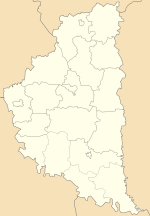Battle of Zboriv (1649)
| Battle of Zboriv (Zborów) | |||||||||
|---|---|---|---|---|---|---|---|---|---|
| Part of the Khmelnytsky Uprising | |||||||||
 Painting of Jean-Pierre Norblin de La Gourdaine (1780s) |
|||||||||
|
|||||||||
| Belligerents | |||||||||
|
|
|
||||||||
| Commanders and leaders | |||||||||
|
Bohdan Khmelnytsky Khan İslâm III Giray |
King John II Casimir | ||||||||
| Strength | |||||||||
| 40,000 Ukrainian cossacks 20,000-25,000 Crimean Tatars | 16,000 | ||||||||
| Casualties and losses | |||||||||
| Unknown | Unknown | ||||||||
|
Location within the Ternopil Oblast
|
|||||||||
The Battle of Zboriv (Polish: Bitwa pod Zborowem, Ukrainian: Зборівська битва), during the Khmelnytsky Uprising, was fought near the vicinity of Zborów (village of , Ukraine) on the Strypa River, and near the Siege of Zbarazh. The battle was fought between the combined Cossack-Crimean force and the Crown army of the Polish-Lithuanian Commonwealth.
King John II Casimir Vasa and the main Polish army left Warsaw on 23 June and had made it to Toporiv in the final days of July when Mikolaj Skrzetuski (Jan Skrzetuski in Henryk Sienkiewicz's With fire and Sword) informed the king of the desperate situation at Zbarazh. The king made it to within a half-mile of Zboriv on 13 August.
Earlier, on August 9, 1649 Bohdan Khmelnytsky redeployed his main forces from Zbarazh to Staryi Zbarazh to the west where the terrain hid them from the Poles, while he used deception to prevent the besieged from noticing. The Horde, followed by the Cossack Host advanced toward the royal camp during the night of 15 August.
The Crown forces were surprised during the rainy and foggy day while crossing the river Strypa. The Horde split into two parts and attacked from the front and the back, but the king rallied his army to repel the attack and the Tatars retreated by nightfall.
The night brought a council of war on the Polish side and two letters from the king, one for the Khan and one for Khmelnytsky. The letter to the khan "reminded the khan of the favor that he had enjoyed from the Poles in his youth, while sojourning as a captive...invited the khan to a renewal of their old friendship...receiving money for past, present, and future years." The letter to Khmelnytsky commanded him to "abandon all hostile actions and retreat ten miles from our army, and send us your envoys - what you desire from us and from the Commonwealth."
...
Wikipedia

